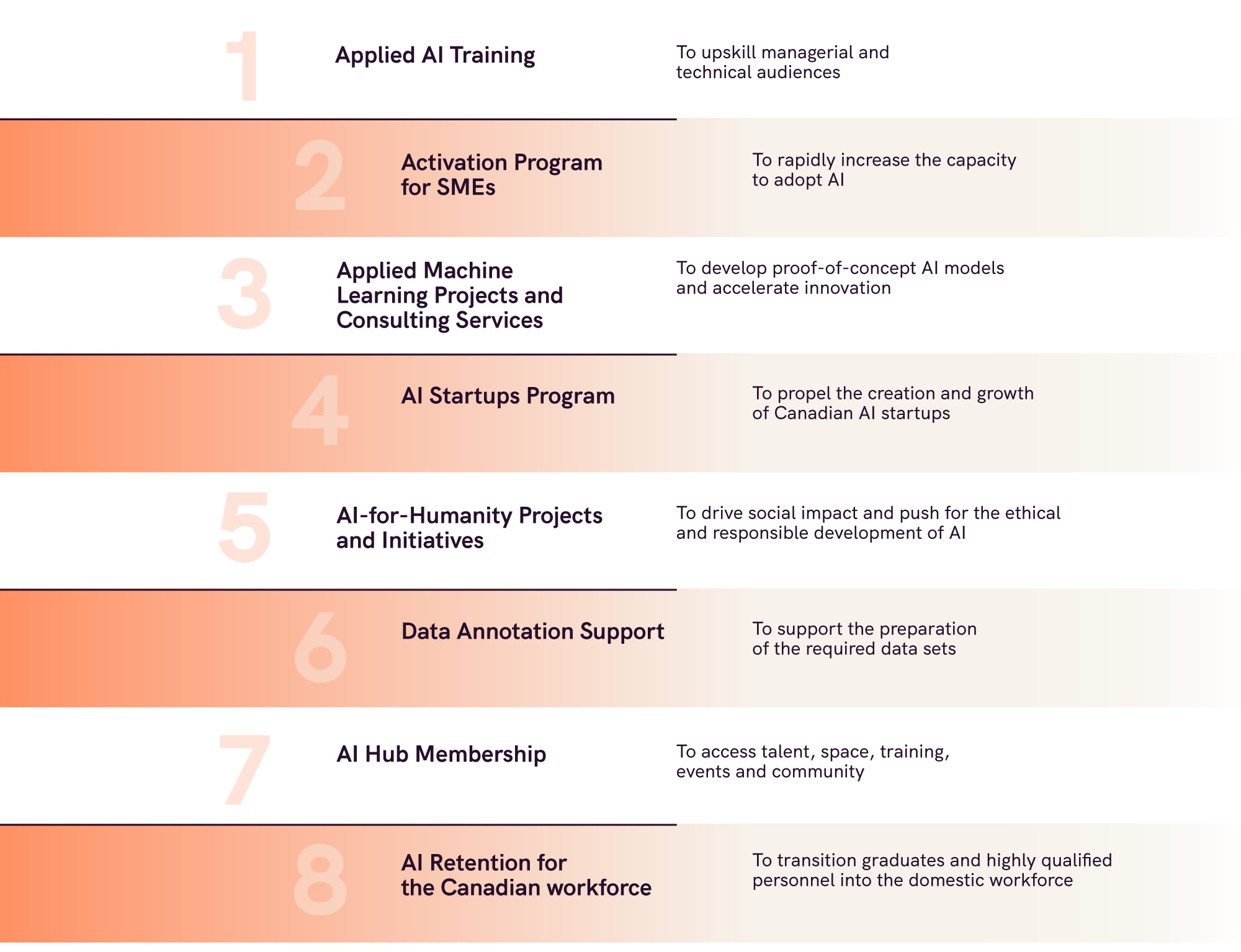2021-22 Summary of AI Adoption Activities – Pan-Canadian Artificial Intelligence Strategy
AI Adoption, a Mila focus area that gained momentum in 2021-2022
The strategy’s first phase of implementation allowed Mila to identify priority areas in line with its AI adoption efforts. Mila identified eight parallel fully integrated and complementary tracks, each targeting a specific component of AI adoption. Mila will also develop two priority industry verticals (health and climate/energy) to help organizations operating in these sectors to leverage AI and increase their impact.
Description of the 8 tracks for AI adoption
Drawing from the strategic focus areas and program objectives outlined in the previous section, Mila will deploy 8 parallel tracks, each targeting a specific component of AI adoption:

Mila has also been working to scale its capacity to design, pilot, deploy and/or expand a wide range of outreach activities and specific engagements to advance the adoption of AI in Canada. These programs will support cutting-edge initiatives to apply the results of research outcomes, develop AI skills through real-world implementation, and deploy AI-enabled solutions that capture social or economic opportunities.
Projects carried out in recent months
Launch of Mila’s AI Activation Program for SMEs
In 2021-2022, program efforts focused on:
- Identifying the distinctive needs of SMEs in terms of engagement ideal length, type of support, and content depth;
- Identifying the appropriate portfolio of activities to meet those needs;
- Validating design hypotheses and program design with various ecosystem stakeholders;
- Refining planned activities and their chronology to optimize impact and reach;
- Defining and recruiting for key roles to successfully launch the program;
- Reaching out to SMEs and presenting the program to launch a first cohort;
- Revamping the communications strategy related to AI adoption.

Realizing Applied Research Projects with Industry Partners
In 2021-2022, program funding enabled Mila’s applied machine learning research team to develop proofs of concept AI models in experimental areas through co-funded projects with an organization:
The applied machine learning research team closely collaborated with Optina Diagnostics in the development of the Retinal Deep Phenotyping™ diagnostic platform for detecting the cerebral amyloid status and other key biomarkers for Alzheimer’s disease.
The applied machine learning research team also worked with another company that processes thousands of ID document verification requests on a daily basis for a wide range of clients and are working on developing systems that can aid humans in detecting digital forgeries by flagging such likely forgeries and highlighting the areas of the ID document that are suspect.
Delivering on Mila’s Program for Startups
In 2021-2022, Mila focused its efforts on the following:
- Organizing multiple networking events that aim to foster the startup ecosystem at Mila, including the creation of a twelve-week cohort of entrepreneurs with regular meet-ups;
- Awarding the title of Mila Startup to several new companies and providing with useful resources for their development, such as monthly private discussions and local contacts to propel their project forward;
- Collaborating with the startup ecosystem in Montreal, including local accelerators like Centech which delivered a Bootcamp for future entrepreneurs, Next AI which provided a workshop on the business model canvas, and Quebec Venture Capital funds;
- Inspiring the Mila community to launch their startup through monthly talks (“Share Times”) with serial entrepreneurs and business experts;
- Doing the matchmaking and coordination work required to offer residencies for Mila scientists willing to discover how startups work while helping them leverage their AI projects.

Accelerating key AI for Humanity projects
The funding allowed us to focus on and accelerate the advancement of two key projects:
AI against Modern Slavery (AIMS). Initiated by Mila, the AIMS project seeks to provide an open source tool capable of automating the analysis of statements related to the Modern Slavery Act.
Legal AI Databank. The goal for the AI Databank is to enable NGOs, policy makers, lawyers and judges to identify meaningful ways to hold AI developers accountable for the human rights abuses perpetrated by their technologies.

Broadening the reach of Mila’s AI Hub, while focusing on key industry verticals
In 2021-2022, efforts were made towards:
- Enhancing and upgrading Mila’s servicing activities to meet the needs of client organizations;
- Hosting and/or co-organizing events for industry partners, such as the Montreal AI Symposium, the Mila Partners Symposium, Partners Workshops and AI & Quantics events.
- Strengthening two priority industry verticals:

Health
- Bringing together key health industry players and participating organizations to foster the growth of an AI, life sciences and health ecosystem to start reflecting on high-impact projects;
- Co-hosting the Synthetic Data for Health Symposium to address the opportunities and challenges around the use and deployment of synthetic data in healthcare.

The fight against climate change
Mobilizing a multidisciplinary team to explore Mila’s strategic action areas related to climate, energy and sustainability and build a strong vertical focused on applying AI to fighting climate change.
A substantial communications strategy
Much of the above work has led to the launch of the new Industry section on the Mila website, which highlights the services offered to organizations by Mila’s teams.
Several videos outlining these services have also been made available online to support a targeted promotional campaign to be rolled out in the summer of 2022.





